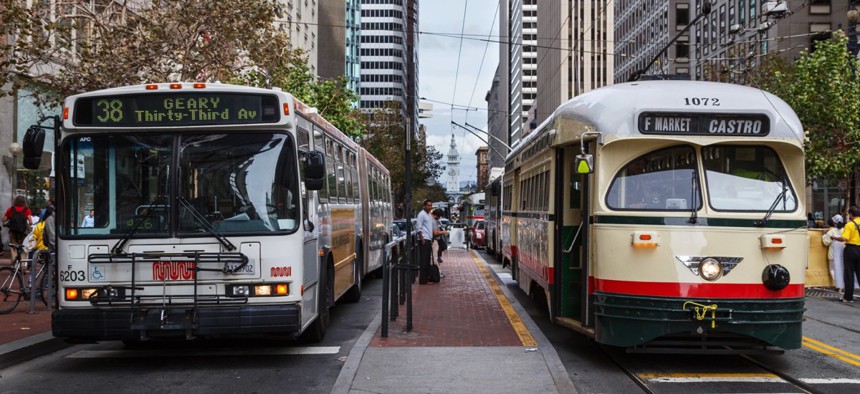Private Bus Services Aim to Disrupt Local Transit Networks

Jannis Tobias Werner / Shutterstock.com

Connecting state and local government leaders
Transportation startups have San Francisco officials worried over everything from accessibility and available curb space to the more typical insurance issues.
This week in the nation’s capital, a Boston-based private bus transit start-up company, Bridj, launched its initial service connecting the Dupont Circle neighborhood and K Street corridor with Capitol Hill.
If Bridj’s private buses, which have no fixed route and change their service offerings depending on customer demand, catch on, they could, in theory, lead to some of the same kind of public-space conflicts similar transportation start-ups have been facing in San Francisco, where local officials have been scrambling to keep them in check.
Chariot, joined by Leap in April, offer commuters a luxury alternative to the city’s oft-at-capacity and sluggish Muni bus and light-rail system.
Complaints of the services double parking and blocking San Francisco driveways and loading zones already have traffic enforcement writing tickets, KGO-TV reported, and one San Francisco Board of Supervisors member, Mark Farrell, requested a policy proposal from Muni and the San Francisco County Transportation Authority.
Farrell’s office released a statement just prior to Tuesday’s Board of Supervisors meeting:
While I believe these new commuter services are clearly serving a market need, we need to have more information and data in place to make informed decisions regarding any potential regulations. This report from our two leading transportation agencies will drill-down into the questions that are outstanding and provide key recommendations for how the City should move forward with next steps.
Chariot runs 14-seat vans along five crowdsourced routes that can be tracked via mobile, and its cheapest offering is two rides for $10.
Boasting 5,000 rides a week, the service will roll out WiFi in May and just raised $3 million from investors to expand within San Francisco for now and outside the city by year’s end.
“We fill in the gaps of a transportation system in any city,” CEO Ali Vahabzadeh told Bloomberg Business.
Competitor Leap drives redesigned buses with WiFi, USB ports and food for sale along one route, with more coming. A single ride costs $6 or $5 when bought in bulk.
The service’s buses have come under fire for being purposely wheelchair inaccessible with a U.S. Department of Justice discrimination complaint filed, according to the San Francisco Chronicle.
Leap told the Chronicle its “understanding is that used vehicles do not have the same accessibility requirements as new vehicles,” the service having bought its buses at auction.
Farrell wants to know how shuttle services fit into San Francisco’s transportation, sustainability and climate-action goals.
Other issues to be addressed in a joint white paper include whether the city has jurisdictional control over regulating the services, accessibility, curb space management and insurance and consumer protections.
Farrell will host a hearing on the services when the white paper is released within six months.
“If, and when, these private commuter shuttle services expand, we need to have appropriate policies in place that effectively address further growth and mitigate neighborhood impacts,” Farrell added.
(Photo by Jannis Tobias Werner / Shutterstock.com)

NEXT STORY: PSC brings high-speed access to regional universities





